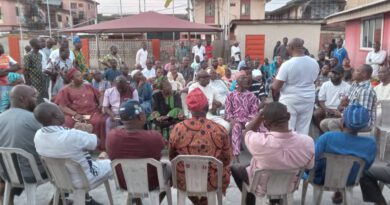The Supreme Court judgment on local governments and its implications – Dr. Muiz Banire
In my column of last week, I analyzed the decision of the apex court alluded to above with reference to the legal issues arising therefrom. In the discourse, I did intimate my readers with the fact that beyond the judgment of Abiru, J.S.C., I was yet to read the full judgments of the other six justices of the court that constituted the panel. To that extent, I was circumspect in my reasonings and expressions. Hardly had I published the write up that enquiry started flowing in as per the implication(s) of the judgment, particularly for States that had created Local Council Development Areas and their equivalents.
My predictable response to the enquirers, as indicated above, is that not only that I had not read nor digested the remaining judgments of the panel, but that I was confronted by space constraints. In this column therefore, I am addressing the concerns raised by these readers and such other germane issues that I could not assertively deal with without digesting the judgments of the other Justices of the Supreme Court. Having digested the judgment, I can now unequivocally align myself with the reasonings and conclusions of Their Lordships. In my last intervention, I had said that legally, the reasonings and the conclusions could be challenged if narrowly viewed from the perspective of law alone; but reading through the entire judgments and as specifically detailed out by Garba, JSC, in His Lordship’s judgment, the decision was grounded largely on policy. This much perspective I alluded to in my earlier intervention ( See my column in the
Daily Sun of 1st August 2024 “Local governments in Nigeria and the latest apex court decision https://thesun.ng/local-governments-in-nigeria-and-the-latest-apex-court-decision/” ). The apex Court, beyond being primarily a court of law, as I have consistently contended, is a court of policy much more than a court of law. To that extent, the court appreciates and interprets the law as an instrument of social engineering. Reading through the reasonings of My Lords, I saw teleological interpretation of the law, particularly the relevant provisions of the Constitution in question, as the guiding principle. This is the most pragmatic approach to the construction of the law at the level of the apex Court. Certainly, the Justices of the court and other judges in the country, are not ghosts who live in another planet, they observe, they see, they feel and survive in the country in the same way and manner most Nigerians do. This much is reflected in the pronouncements. Hence, in their interpretation of the law, the courts, most especially the apex court, cannot pretend to be oblivious of the reality in the country. The naira redesign case is another instance in which the court has demonstrated the same reasoning and appreciation. This growing fidelity and trend to the approach is therefore encouraging towards shaping governance of the country. Beyond this, I must not fail to comment on the seeming dissent of Abiru JSC on the issue of direct payment of allocation to the Local Governments.
His Lordship had, on the ground that the Constitution, having provided for a specific mode of effecting such payments in what appears to be compulsory, the court is not in a position to override the provision and engage in judicial legislation. While I sympathetically feel for My Lord as a positivist on this issue, I am more disposed to the purposeful interpretation of the law. Law cannot, and must not be construed, particularly the Constitution, in a manner bereft of a purpose. Just as remarked by the other Justices, no one is left in doubt that, by the Constitution, the allocations to the Local Governments are exclusively meant for them and sacred. Once that is appreciated, the mode of transmission becomes secondary and not sacrosanct, the factor of which informed the conclusion of the other Justices that the word ‘shall’, as used in the context of the material constitutional provision, must be construed as discretionary and not mandatory. This view is further informed and reinforced by the disclosures in the pleadings of the parties that the funds meant for the Local Governments had been serially raped and abused by the State Governors, the vice of which must be abated.
Again, this reality is further buttressed by the fact that the Local Government under the country’s Constitution, is recognized as the third tier of government, as variously opined by the Justices except in the dissent. As I have, in several interventions contended, federalism has no uniform universal connotation and largely depends on the constitutional dictates of the country concerned. This much NIKI TOBI, JSC as he then was, captured in his remarks in the case of Olafisoye v F.R.N. (2004) 4 N.W.L.R. (Part 864), 580 @ 647 that “..there is no universal agreement as to what is federalism or a federal government…A federal government will mean what the constitution writers say it means…
Therefore, a general definition of federalism or federal government may not be the answer to the peculiar provisions of the nation’s constitution which is the fons et origo of its legal system. Thus, the word ‘federalism’ conveys different meanings in different constitutions as the constitutional arrangements show particularly in the legislative lists.” I am glad that virtually all the Law Lords that determined this case did not mince words in asserting that the Nigerian Constitution recognizes the Local Government as a third tier of government, and in no way subordinate to the States or the Federal Governments. This is where I believe that My Lord, Abiru JSC missed the point. If this position is agreed on, then it becomes easy, stemming from the fact and reality that the appropriated funds are solely for the Local Governments’ use, that mode of payment is immaterial or inconsequential, at least, not in the manner canvassed. Regardless therefore of the directory provisions creating States Joint Allocation Account, the destination is what actually matters in the circumstances. Beyond the legalese, this is a judgment well received by the citizens. I commend the apex court in this regard while expecting more of such revolutionary pronouncements.
Law, as I have always opined, does not operate in vacuo. It exists, not only for the people but for their progress. As rightly observed by the courts, the law, particularly the constitution, is an organic instrument like human beings; as human beings grow daily in all ramifications, so must the law, especially the constitution, be construed to catch up with the realities of the moment and the dynamism of society. This is the only way to justify the existence of the law in society. With this jurisprudential point disposed of, I now focus on the implications of the judgment for all. In this respect, as emphatically held by the apex court, no Local Government can now henceforth be run by any undemocratic entity or structure. In other words, only elected officials can now administer the Local Governments. The simple implication of this is that it is unconstitutional for such entities not democratically constituted to touch the funds appropriated to the Local Governments.
Certainly, in the annals of the country, this will appear to be no news as the Supreme Court has consistently upheld this position in several previous decisions. What has, however, changed in this case, is that it would appear that, unlike in the previous decisions, there is now a sanction for misconduct by way of enforcement mechanism. The decision of the court now confers on the federation, represented by the Attorney General of the Federation, to halt the payment of funds to any such Local Governments not being managed or administered by democratically elected officials.
The import of this is that no unconstitutionally constituted Local Government can henceforth benefit from the federal allocation. This, it is hoped will enthrone sanity in the system by preventing diversion or pilferage of Local Government funds by the State Governments. Ancillary to this is that, the Local Governments can now access their appropriated funds directly, and no more through the States. With this, no Local Government can now complain of lack of funds to execute its programs. The elected Local Government officials are now to be held accountable and culpable for any failure to deliver services. This much is the goal of the President, and for which we commend him. The further implication of this, as rightly opined by the Attorney General of the Federation, Prince Lateef Fagbemi, SAN, is that any tampering or misuse of the funds, by whatever means, either at the behest of the Local Government elected leaders or at the instance of the State Government, would now be met with criminal prosecutions. I have no doubt that the Nigeria Financial Intelligence Unit (NFIU) is now further empowered to monitor the expenditures on the accounts.
To ensure adherence, there is need for the AGF to make scapegoats of some Local Government officials in this regard. In order to further compliment the steps taken so far in the sanitization of the Local Governments administration, and as remarked by one of the Law Lords, it is incumbent that the mechanism for the election of the leaders be visited along. There is no doubt that under the present dispensation, election through the States Independent Electoral Commission remains a sham. There is a need to urgently overhaul this if the judgment is to be further impactful. We must have elected officials who are not betrothed to the State Governors; that are independent-minded and visionary, not puppets imposed by the Governors. I am aware that there has been proposal to replace the State Electoral Commissions with the National Electoral Commission, which I have no issue with, other options mooted such as independent selection and appointment of the governing board of the State commissions, will still end up with the same fate.
He who pays the piper will continue to dictate the tune, except appropriation will come from the federation account and there is an electoral commission independent of these Governors. Now the question is what happens to the States that have established Local Council Development Areas or their equivalents? Would they be able to continue feeding the helmsmen of such Councils with the funds from the federation accounts when the headship cannot be said to have been democratically elected? Remember that their election, most times, is into the fraction of the geographical area of a listed local government. This implies that no election could have been said to be validly conducted, and as such, no democratically elected official could have emerged from such LCDAs. I believe that the same logic applies to elections into the listed Local Governments bereft of the entirety of the geographical area stipulated in the Constitution. What this implies simply is that henceforth, elections can only be conducted into the 774 constitutionally listed Local Governments.
The implication of which is that such purportedly elected officials, either in the listed Local Government covering less than the entire geographically recognized area or that of the Local Council Development Areas, meddling with the appropriated funds from the federation account is liable to criminal prosecution. Technically speaking, therefore, not until such LCDAs or their equivalents, are listed in the Constitution, elections into them or partaking of allocation from the federation account would be illegal. By extension, appointment of administrators into them by whatever nomenclature will not only be unconstitutional but criminal. The best that can, therefore, happen is the appointment of supervisors or supervisory councilors into the LCDAs and no more. May I further reinstate that what affects allocation from the federation account equally applies to the ten percent allocation from the States’ internally generated revenue.
This is the further import of the extant judgment of the apex court under consideration. The further effect of the judgment is that the legislative councils of the various Local Governments become functional and activated. The degree of interference of the state legislatures now becomes minimal and limited to the provision of structure of administration and other ancillary issues. With the above developments, it is now hoped that more competent and credible Nigerians will vie for the leadership of the Local Governments and engender impactful governance at that level. This will be the beauty and expectation of adherence to the dictates of the judgment. Once again, my prayer and plea to the Federation, particularly the AGF, is to be unrelenting in the pursuit of ideal goals. Ire o!




